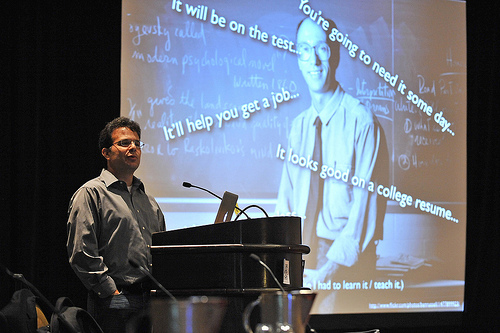
The nationally-known principal also addresses the “elephant in the room” topic of why his school doesn’t have a librarian.
Just follow a high school student around for a day, says Chris Lehmann, founding principal of Philadelphia’s Science Leadership Academy (SLA), and you’ll see why most teens think “School stinks.” Lehmann, who delivered the October 27 keynote at School Library Journal’s 2012 Leadership Summit, isn’t surprised by these negative sentiments. He believes that outdated educational practices and decisions based on “reductive learning measurements,” or “cheap data,” are a failure of imagination and aren’t creating schools that engage learners.
The innovative educator rejects what he sees as an outdated “19th-century factory model” of school operations in favor of a new “citizenry model.” Lehmann challenged attendees to consider the number of times they’ve heard the mantra that teachers must strive to educate 21st-century workers. “Compliant workers aren’t going to solve the problems of the future; we need to educate people who can think, question, challenge, and solve,” he says.
So what makes SLA different, and what does the “citizenry model” look like? It’s all about the student. “We learn best when it matters to us,” remarked Lehmann, who insists education must be student- and inquiry-driven, community-based, collaborative, and passionate. “High school is real life, not preparation for real life,” and students should be learning and exploring in ways that makes sense to them. “If we train kids to be workers, that’s what we’ll get. If we train them to be citizens, we’ll get workers and husbands and wives, parents and citizens.” Our purpose, he believes, should be to teach students “how to learn…how to live…to be better than they are today.”
Lehmann insists that kids need adults, so SLA teachers typically assume a mentor role, which means encouraging students to pursue what interests them. In lieu of report cards and benchmark tests, students create “artifacts of their learning.” The results? Engaging, personal projects that teachers could never have dreamed up or designed.
The educator worries that while “schools belong to our democratic tradition,” “public education is less valued now” than at any other moment in the past century. “The money we spend on kids is totally dependent on their parents’ incomes,” he stated, noting that [the urban] SLA receives approximately $6,000 per student compared to a nearby suburban community, which spends $22,000 per capita. Citing Philadelphia’s recent billion-dollar budget cut (from an initial budget of3.3 billion), Lehmann commented, “you don’t get there without a pretty high body count.” SLA has no librarian, and students learn languages via a Rosetta Stone program.
His parting advice for the audience? “Reclaim schools from those who consider us managers.” “Unlearn to learn.” “Dream Bigger.” “Breakdown barriers.” “Include all stakeholders.” “Have fun.” And finally: “Be humbled by our task: we teach kids.”
As to the “elephant in the room,” Lehmann talks about the lack of a librarian at SLA at the beginning of his talk:
SLJ Summit 2012: Chris Lehmann keynote from School Library Journal on Vimeo.

